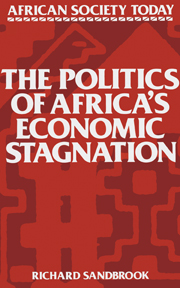Book contents
- Frontmatter
- Contents
- List of tables
- Acknowledgements
- Glossary
- Map: African states and principal cities
- 1 Disappointments of independence
- 2 Why capitalism fails
- 3 Colonial roots of the contemporary crisis
- 4 Class, tribe and politics
- 5 Anatomy of personal rule
- 6 The downward spiral
- 7 Survival strategies
- Notes
- Guide to further reading
- Index
- Farm Labour
4 - Class, tribe and politics
Published online by Cambridge University Press: 01 June 2011
- Frontmatter
- Contents
- List of tables
- Acknowledgements
- Glossary
- Map: African states and principal cities
- 1 Disappointments of independence
- 2 Why capitalism fails
- 3 Colonial roots of the contemporary crisis
- 4 Class, tribe and politics
- 5 Anatomy of personal rule
- 6 The downward spiral
- 7 Survival strategies
- Notes
- Guide to further reading
- Index
- Farm Labour
Summary
How do class and tribe affect politics in Africa today? Some writers, mainly Marxists, define class conflicts as the primary contradictions in Africa. They relegate intraclass struggle involving ethnicity or religion to the less important category of ‘secondary’ contradictions. Other writers, mainly conservatives, see communal conflicts everywhere. They dismiss the significance of class on the grounds that self-conscious classes do not exist. Both of these approaches are unduly reductionist. Neither class nor tribe alone is the key to unravelling African politics. Both must be taken seriously as independent though interacting principles of political mobilization.
What emerged from colonial rule were overwhelmingly peasant, not capitalist, societies. Peasants are notoriously difficult to mobilize on a national class basis. In Africa, they generally do not confront an obvious class enemy in the countryside; social stratification has not yet crystallized sharp rural class divisions. There is a small sector of capitalist production, mainly in the cities. However, the modern capitalist classes, the bourgeoisie and the proletariat, are still embryonic. Class alone fails to explain African political life.
Ethnicity is often of greater political saliency than class. Tribalism is not, as some have assumed, a transitory phenomenon, soon to be displaced by class solidarities. Ethnic conflicts, sometimes coupled with religious divisions, will continue to undermine a sense of national purpose. Patriotism fails to unite sectional interests in defence of a broad national vision.
- Type
- Chapter
- Information
- The Politics of Africa's Economic Stagnation , pp. 63 - 82Publisher: Cambridge University PressPrint publication year: 1985



